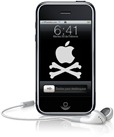Just last week, iTunes hack made top of the technology news when a Vietnamese app developer scooped (reportedly) 400 iTunes accounts to buy his own apps and bring them in the top 50 paid apps list in the ‘Books’ category. This time it’s a Chinese app developer who has managed to bring his app in the top paid app list in the ‘Travel’ category.
It is still not clear how many iTunes accounts have been hacked this time and even though Apple has hired an ‘iTunes security expert’, nothing seems to have been changed. This is second time consecutively in 7 days that 2 iTunes hack scams have surfaced. There are no figures on the amount of purchases made by this Chinese developer from the hacked iTunes accounts. We will keep you posted on this as the news unfolds.
Apple previously reported that only 400 iTunes accounts were hacked. One of our readers who was also the victim of this hack thought otherwise. This is what he commented:
I was one of these so called 400 users. I don’t believe that there are only 400 users. I’ve contacted apple and have received no response from them. someone (i’m assuming it is Mr. Nguyen) racked up well over 1000 dollars on my credit card before I stopped him by changing my password and then contacting my cc company. They insisted on cancelling the card so now the hasle of getting new cards is in store for me. Had I not taken these steps quickly I believe my cc bill would have been much higher… because as I was cancelling them the receipts were still coming in via email.
So, I guess theft is something people don’t worry about anymore if it is across the internet. Especially, I guess if the person resides in another country. If things don’t change and consequences for this behavior is not enacted, this issue will only be common place.
Signed, Frustrated Overcharged Credit Card Holder.
Apple clearly mentioned that the hack was not a breach into the iTunes servers but rather it was the negligence on the part of the iTunes users who must have gave away their passwords in phishing scams or their passwords were too obvious (who would dare trying random passwords on 140 million accounts?)
Here’s the official statement from Apple regarding the iTunes hack by Thuat:
The developer Thuat Nguyen and his apps were removed from the App Store for violating the developer Program License Agreement, including fraudulent purchase patterns.
Developers do not receive any iTunes confidential customer data when an app is downloaded.
If your credit card or iTunes password is stolen and used on iTunes we recommend that you contact your financial institution and inquire about canceling the card and issuing a chargeback for any unauthorized transactions. We also recommend that you change your iTunes account password immediately. For more information on best practices for password security visit https://www.apple.com/support/itunes.
Let’s see what Apple comes up with this time.

